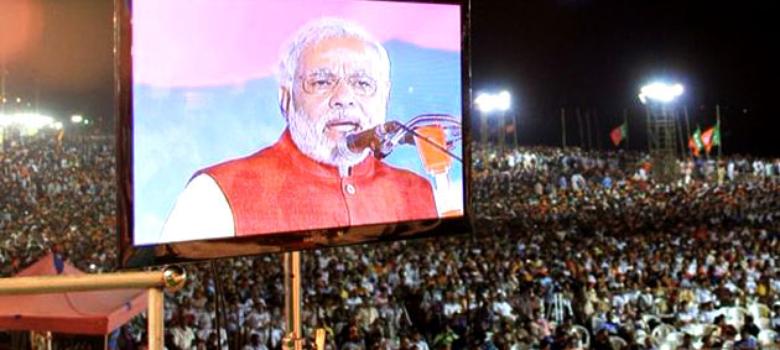Core sector growth has flagged though rejigged methods of calculating GDP have boosted India’s reported economic expansion.
In some cases, the government seems to be not just ignoring last year’s campaign but actively working against it. Where the Bharatiya Janata Party manifesto promised to modernise and upgrade government hospitals, Finance Minister Arun Jaitley has slashed outlays on health care. The manifesto targeted spending 6% of GDP on education, up from the 3.3% level when the new government took office. Instead, the allocation for education dipped substantially in Jaitley’s budget.
History of obstruction
The government faces resistance within and outside Parliament for its lone innovation: the amended Land Acquisition bill. While condemning disruptions to Parliament, BJP leaders ignore their own history of obstructiveness while in opposition, and their public defence of such tactics.
Was there no progress, then, in Narendra Modi’s first year as Prime Minister? Far from it. Parliament approved a few crucial laws, and ratified a landmark agreement with a neighbouring nation. What stands out in these cases, though, is that they’re all legacies of the Congress-led United Progressive Alliance that were stonewalled for years or rejected outright by the BJP.
Item 1 on the list of U-turns is the Goods and Services Tax, or GST. A tax reform unanimously endorsed by economists, GST was on the UPA legislative agenda for years. Unfortunately, chief ministers of BJP-ruled states obdurately opposed the idea, its most prominent critic being Gujarat’s Narendra Modi.
Item 2: UPA’s Insurance Bill. One of its provisions raised the foreign investment limit in private insurance firms to 49% from 26%. The BJP refused to sign on. Prakash Javadekar, now minister in charge of clearing industrial projects without environmental safeguards, led the campaign against the bill in his role as President of the National Organisation of Insurance Officers. Barely 16 months after Javadekar received support from Sushma Swaraj and Arun Jaitley, the Insurance Laws (Amendment) Bill was passed, in a form indistinguishable from the UPA version.
The Prime Minister has made 16 foreign trips in his first year in office, but the signature foreign policy advance of his term so far, which fructified a week ago, concerned a nation he has yet to visit. I’m referring to Bangladesh and the final settlement of the border between the two nations. As with GST and the Insurance Bill, the BJP was against it before it was for it.
Nuclear deal
Perhaps the mother of all flip-flops relates to the civil nuclear agreement between India and the United States. The BJP fought the agreement tooth and nail, damning it as “an assault on the nuclear sovereignty” of India, and swearing to renegotiate it once in power. The Indo-US nuclear deal was followed by the tabling of the Civil Nuclear Liability bill, which described the form compensation would take in case of a nuclear accident. BJP members condemned the bill as unconstitutional and a violation of the fundamental rights of Indian citizens.
Cut to US President Barack Obama’s visit during the 2015 Republic Day celebrations, and the “breakthrough” in negotiations over the nuclear deal. The breakthrough, it turned out, was that the US got exactly what it wanted, a restriction on the liability of suppliers and nuclear plant operators in case of an accident. I don’t think that’s necessarily a bad thing, but to argue the case for restricted liability would take me far from the focus of this column.
For those who believe a year is too short a period of time to judge a government’s performance, I have two acronyms for you: NREGA and RTI. Both the National Rural Employment Guarantee Act and the Right to Information Act were introduced in 2004, mere months after the first UPA administration came to power. Those pieces of legislation may divide opinion, certainly NREGA does, but there’s no denying they fundamentally changed how Indian society functions. Despite all his sloganeering, and his comfortable majority in the lower house, Modi hasn’t come close to promoting anything as important. The only thing that’s saved him from being a complete flop is his flip flops.












